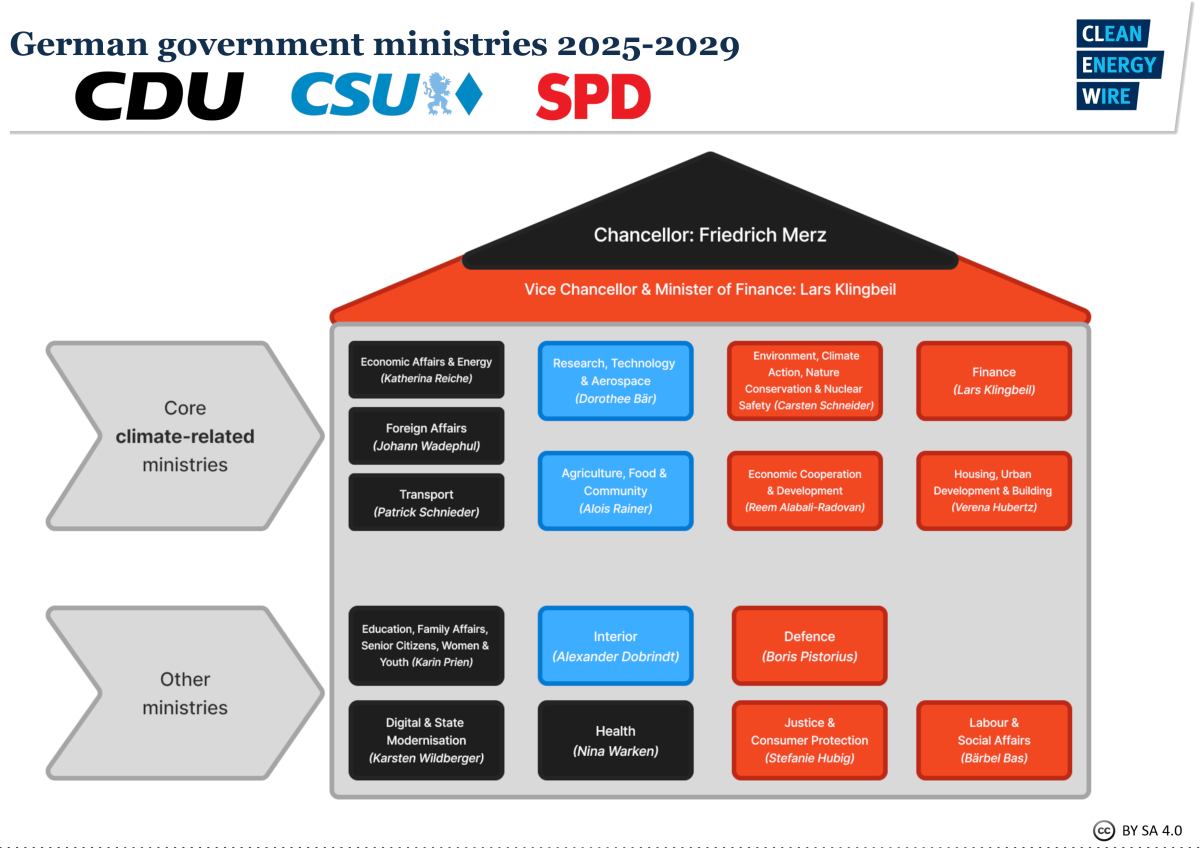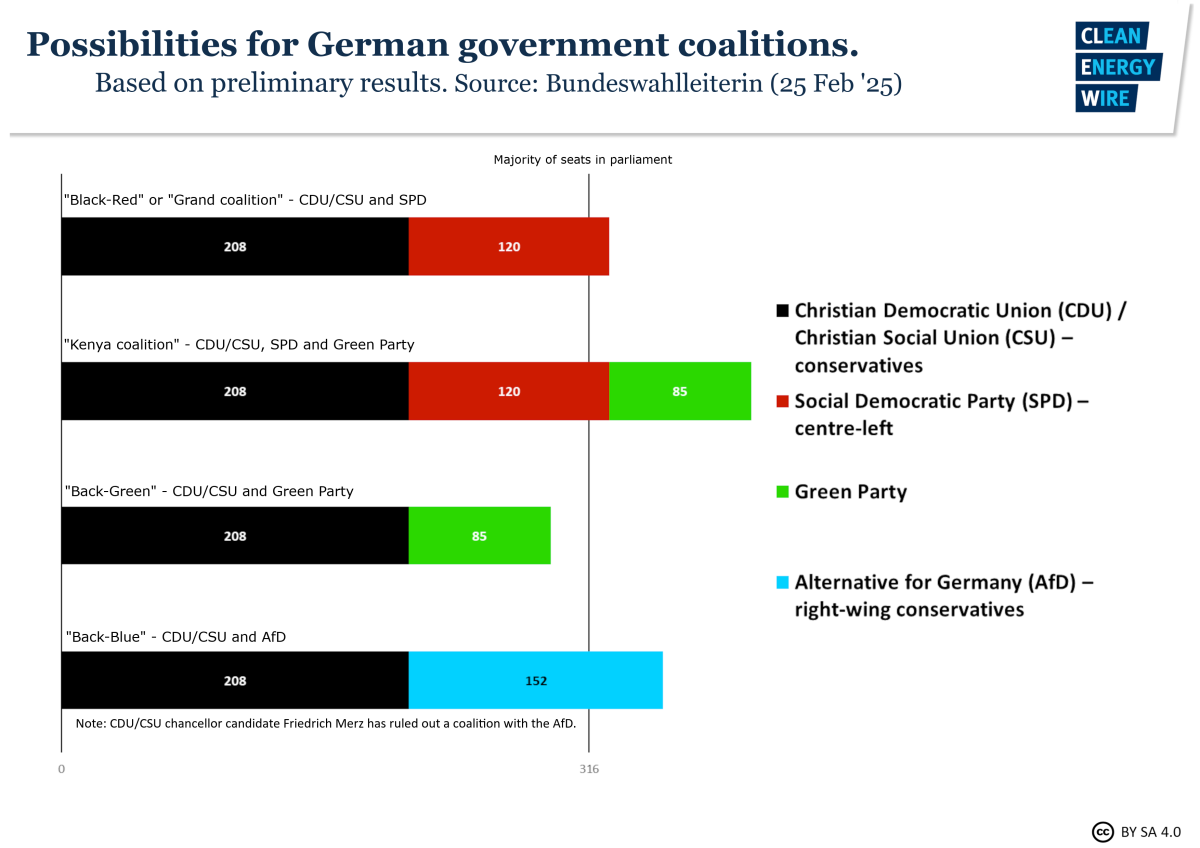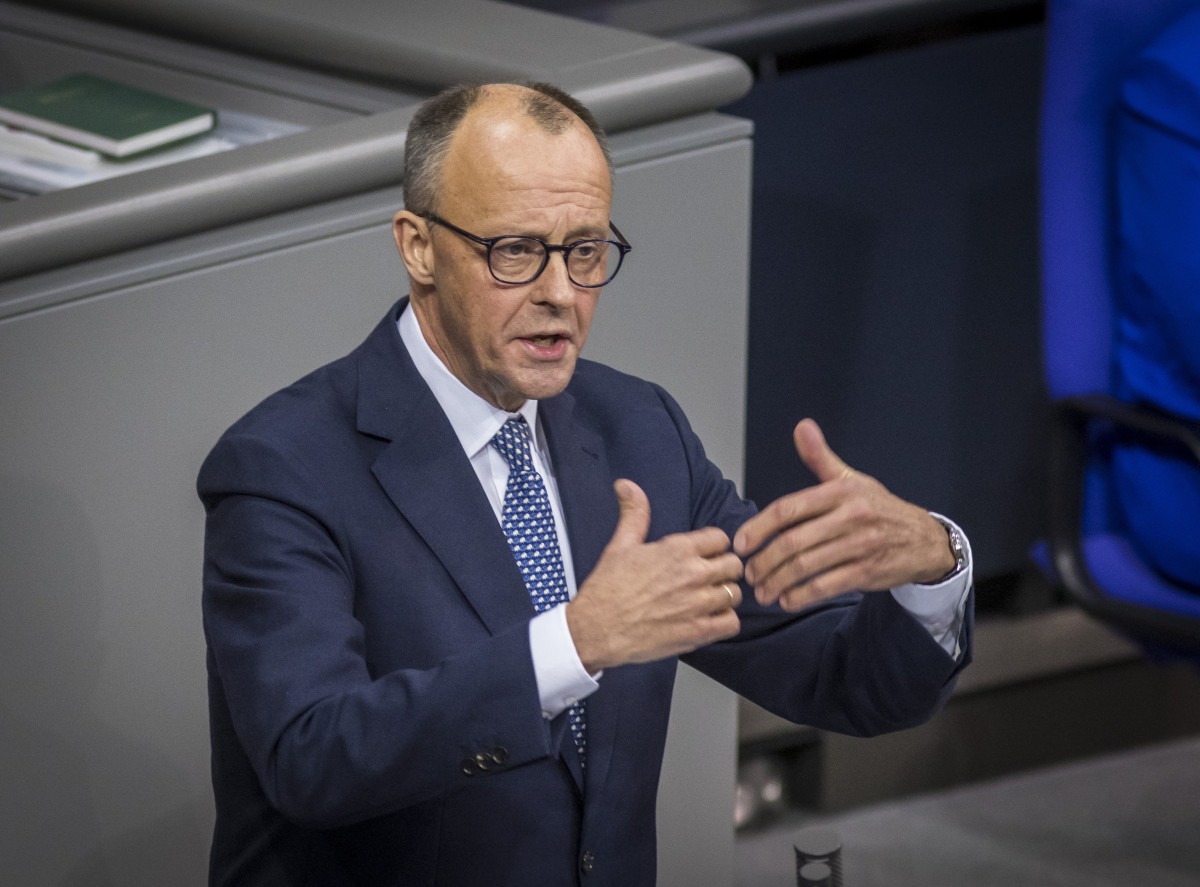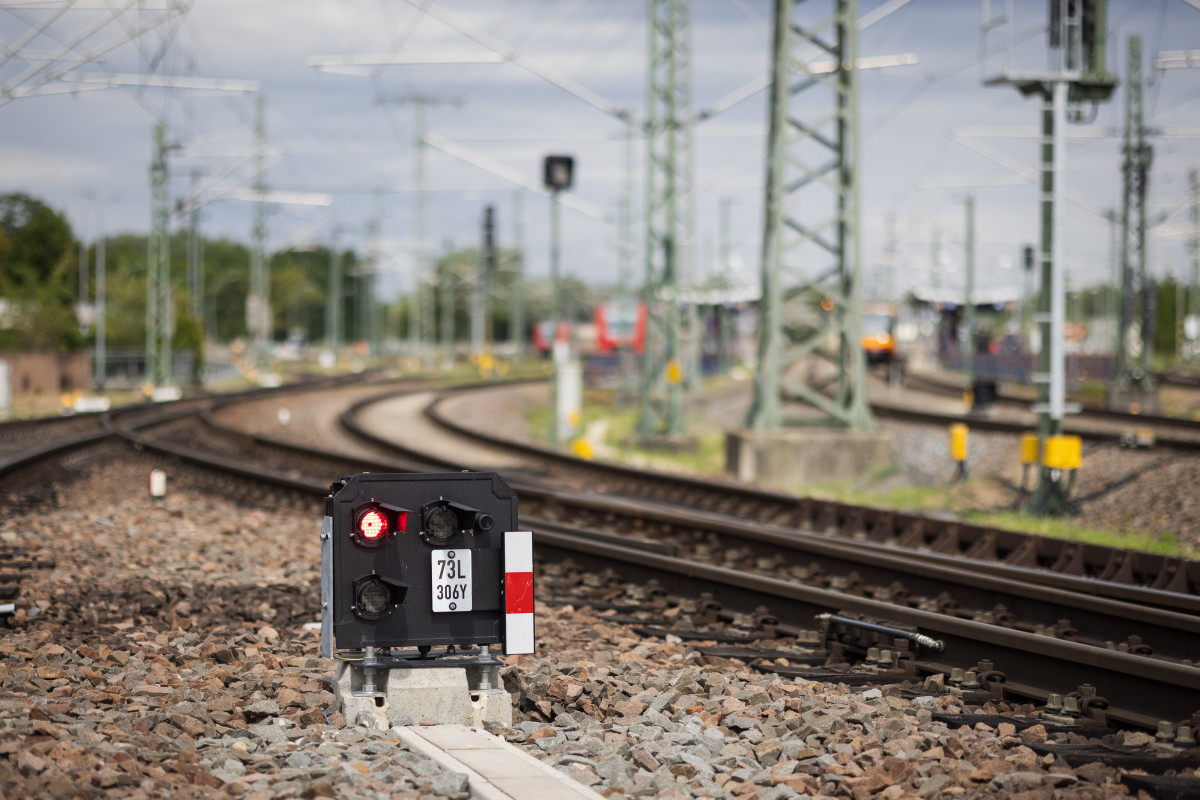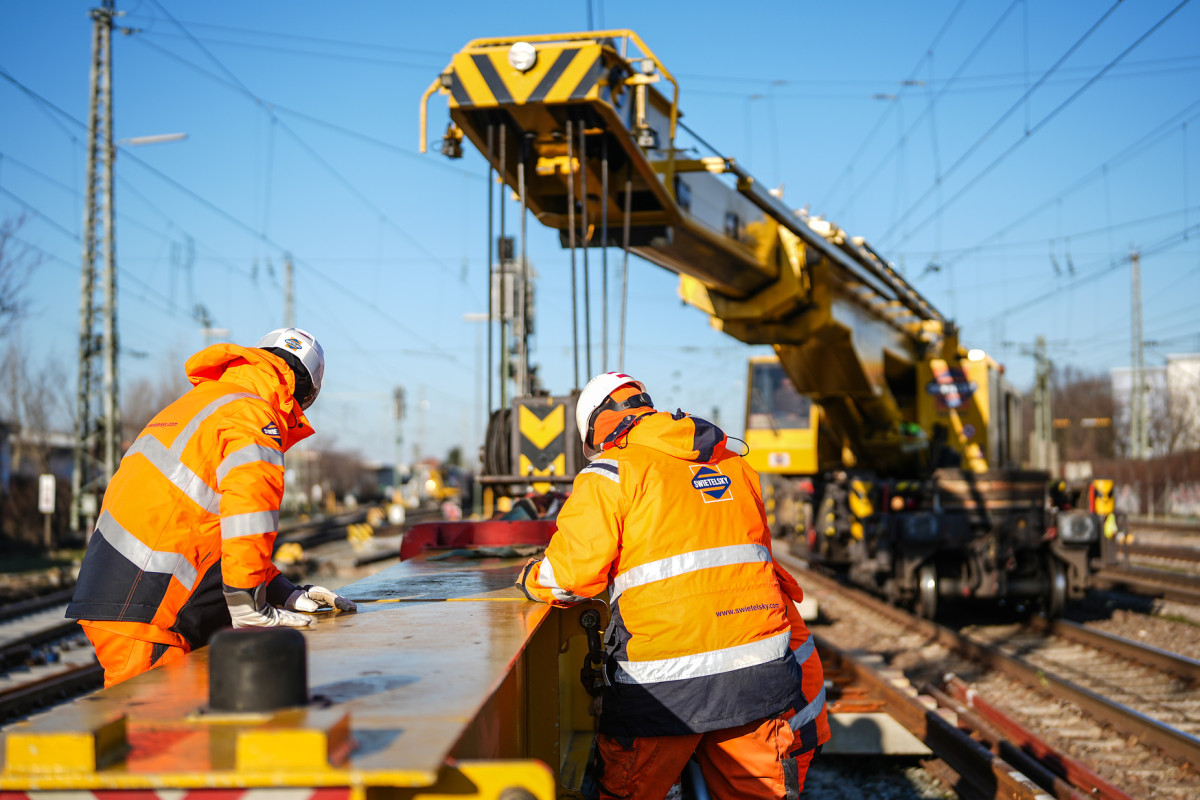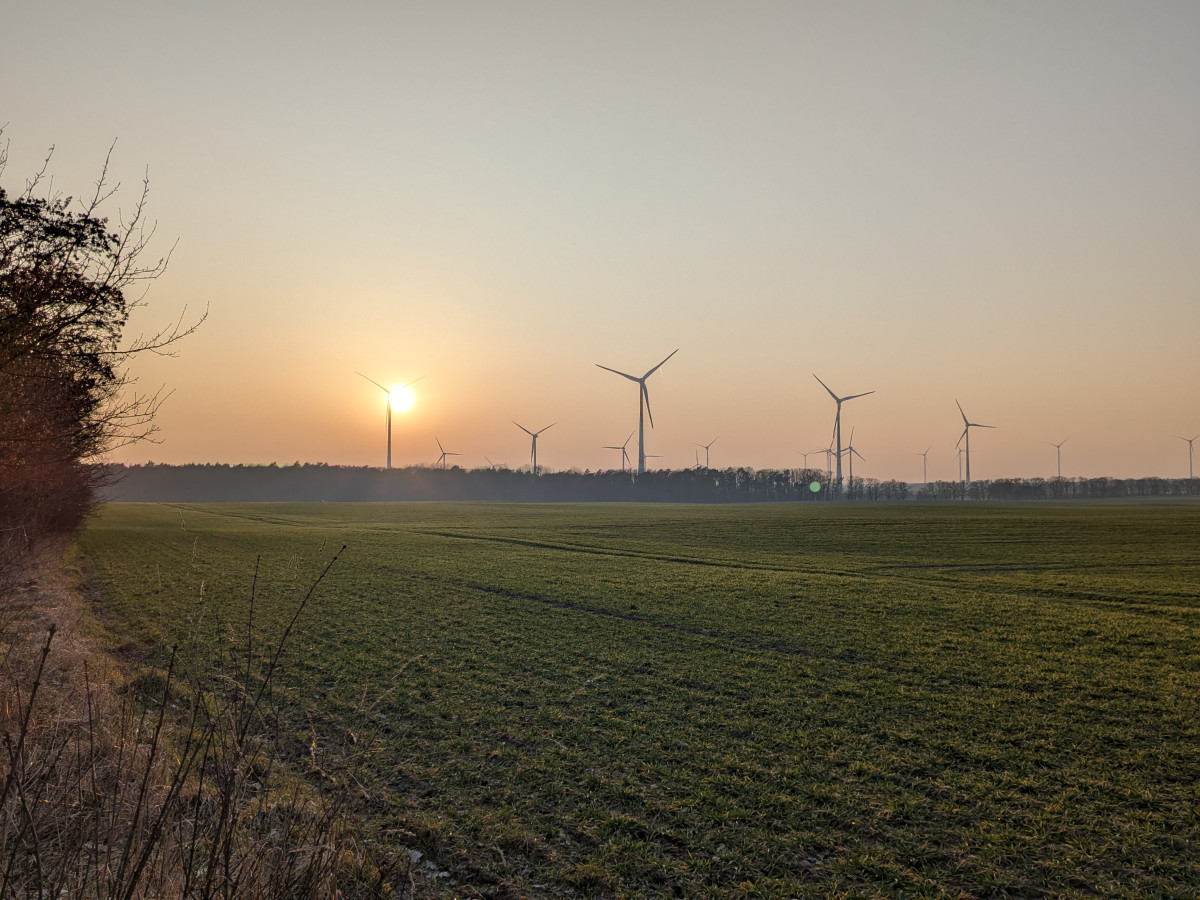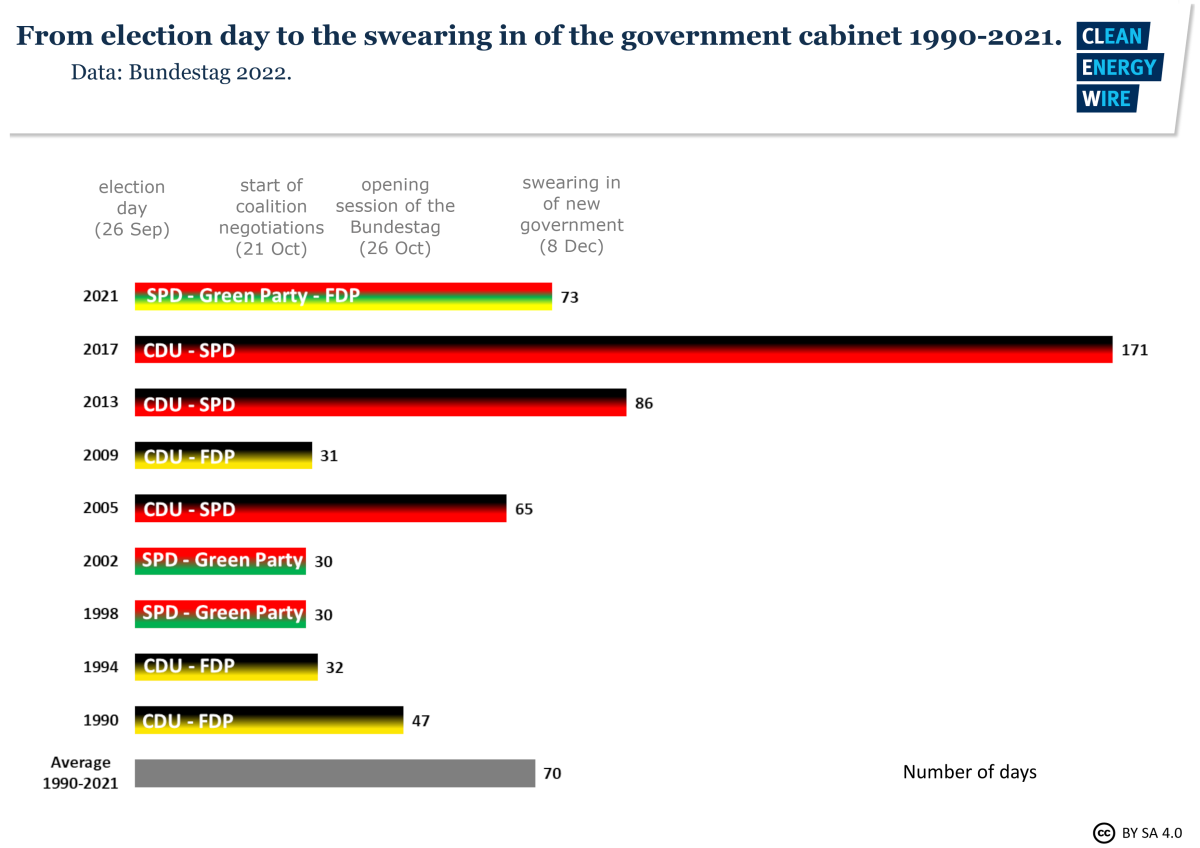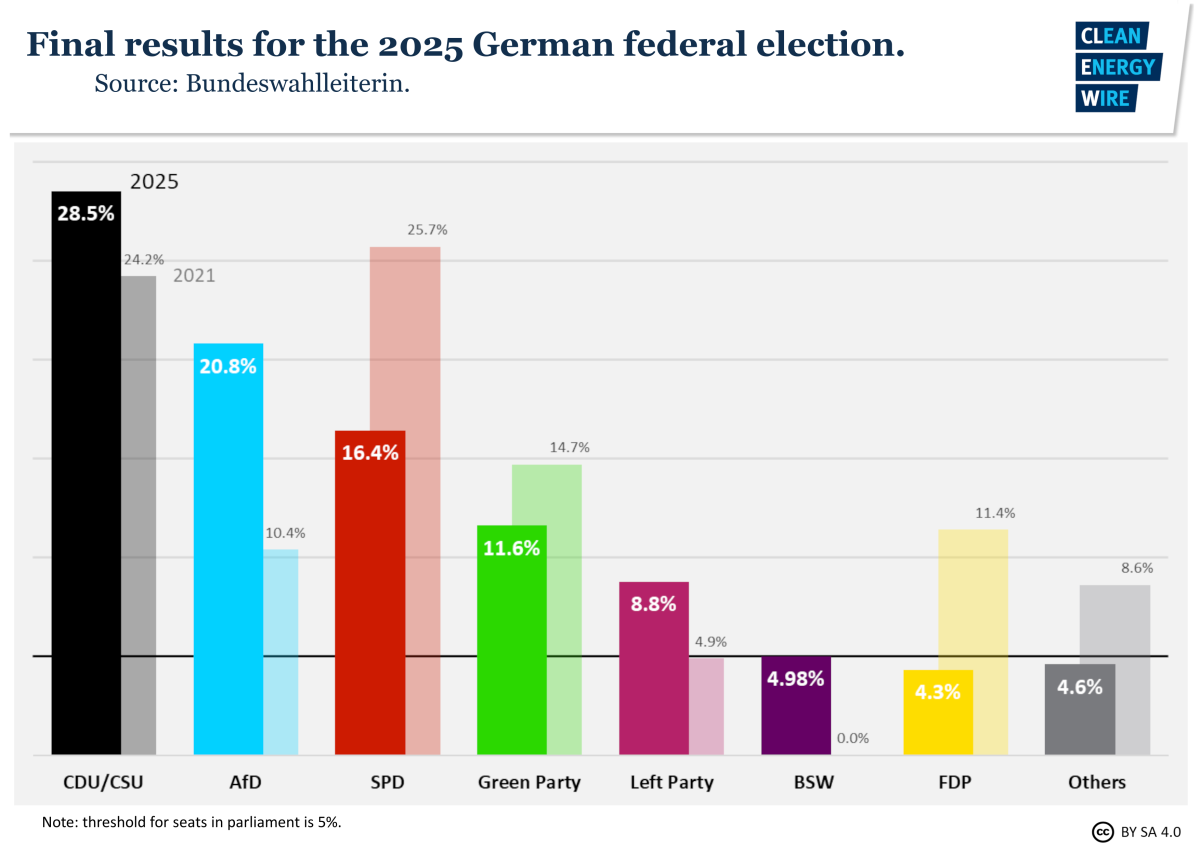Germany's incoming coalition plans massive infrastructure boost via debt rule overhaul
***Now that Germany's new coalition government has officially begun work, you can find all relevant background and information on climate and energy policy under chancellor Friedrich Merz in this dossier: New German government charts cautious climate course for Europe's largest economy***
THE LATEST
Germany's government – Who shapes climate and energy policy under chancellor Merz?
The new coalition government of chancellor Friedrich Merz's conservative CDU/CSU alliance and the Social Democrats (SPD) has signalled continuity on energy transition policy. The cabinet includes both expert ministers – like utility manager Katherina Reiche as economy and energy minister – and those with little experience in their new field of responsibility. This factsheet provides an overview of the government make-up and its role in shaping German energy and climate policy in the coming years.
Read the factsheet here.
EU reliant on next German government’s climate resolve to uphold Green Deal’s promises
The aspiring German coalition government under conservative leader Friedrich Merz is set to assume control at a time of unprecedented transatlantic turmoil for the EU. Amid a backlash against global climate policy led by the new US government, that is echoed by populist parties in Europe, the German government has a key role to play in upholding the EU’s Green Deal that promises to revive European industry as a green technology leader. While the budding German coalition’s plans suggest continuity with the country’s energy transition, ensuring that Merz's goal of economic recovery falls in line with European climate plans might require more from the next chancellor than simply holding course.
Read the analysis here.
What Germany's 2025 coalition treaty says on climate and energy
The conservative CDU/CSU alliance and the Social Democrats have presented their coalition agreement, clearing one of the last major hurdles to forming Germany's next government. The document outlines the parties' policy plans for the next four years.
This factsheet breaks down what it says on climate and energy.
Aspiring German government opts for energy transition continuity
Germany’s prospective coalition government has agreed to continue the country’s landmark energy transition without major adjustments and stick to existing climate targets. Faced with economic stagnation and the geopolitical shake-up after the US election, the coalition parties – the conservative CDU/CSU alliance under chancellor-in-waiting Friedrich Merz and the Social Democratic Party – have put more emphasis on economic competitiveness than climate action. The energy industry praised the continuation of existing policy, while environmental NGOs showed relief over the treaty’s climate commitments, both on a domestic and the EU level.
Read the analysis here.
TRACKER
Election aftermath: Tracking the making of Germany's new government
Conservative CDU/CSU leader Friedrich Merz is set to become the next chancellor and will now lead the coalition negotiations – most likely with the Social Democrats (SPD). The far-right Alternative for Germany (AfD) saw its greatest election success to date, but the CDU/CSU has ruled out forming a government with them. Coalition negotiations can last anywhere from a handful of weeks to a couple of months.
This tracker follows developments from ballot closure to the formation of a new coalition government.
PREVIOUS NEWS
Reactions from energy and climate community to Germany's 2025 coalition treaty
Germany’s prospective coalition government has agreed to continue the country’s landmark energy transition without major adjustments, and stick to existing climate targets. In their coalition treaty, conservatives and Social Democrats put a stronger emphasis on economic competitiveness, while slightly toning down climate ambitions. In this collection, we present first reactions from industry, think tanks, and NGOs to the agreement.
Read the reactions here.
Prospective new German government shows no ambition to speed up coal exit
Germany's prospective next government is stepping back from its predecessor's ambition to speed up the country’s coal exit to 2030, sticking instead to the original 2038 deadline. Leaked negotiation documents reveal that many climate and energy policies remain contested in the ongoing coalition negotiations between conservatives and Social Democrats. Environmentalists warned that the provisional agreements could result in a "massive step backwards" for climate protection not only in Germany but also in Europe.
This article gives an overview of preliminary agreements and point of contention in leaked coalition negotiation documents.

Merz reaches deal on infrastructure fund by promising Greens €100 bln for climate action
Germany's chancellor-in-waiting, conservative Christian Democrat Union (CDU) leader Friedrich Merz, has reached a breakthrough deal on the 500-billion-euros infrastructure fund proposed by his prospective coalition government, by promising to dedicate a fifth of the sum to climate action. Merz agreed to transfer 100 billion euros of the sum to to the country’s Climate and Transformation Fund (KTF), which is dedicated to climate policy spending, thus securing support from the Greens, whose votes are required for the necessary constitutional changes. Read the article here.
Germany’s budding coalition agrees electricity price cuts, e-car subsidies
Germany’s likely next coalition government has agreed to a substantial electricity price cut to relieve households and companies and honour national and European climate targets. The Conservatives, under probable next chancellor Friedrich Merz, and the Social Democrats said they would continue the energy transition by rolling out renewables, and supporting electric mobility and the decarbonisation of industry. To the dismay of environmentalists, other climate policy initiatives barely got a mention in the agreements from which formal coalition negotiations will begin, underlining the general expectations that the issue is not a priority for Merz or his budding coalition.
Read the article here.
Likely next German govt parties agree debt rules bypass for defence and infrastructure, climate focus unclear
Germany’s likely next government coalition parties have proposed an overhaul of state debt rules to make hundreds of billions of euros available for defence and infrastructure investments. The agreement, which faces a big hurdle in the two-thirds majority requirement in parliament, marks the first major deal in the coalition talks between the conservative CDU/CSU alliance of chancellor candidate Friedrich Merz and the Social Democrats. Details regarding what the infrastructure funding would be used for so far remain largely unclear. The Green Party as well as NGOs have called for clarity that climate action and the transition to a sustainable economy become a spending focus.
Read the article here.
KEY BACKGROUND
Below you'll find key background on the coalition negotiations and the process of forming a new government in Germany.
Q&A: Germany's €500 bln infrastructure fund – What's in it for climate and energy?
Germany's prospective next coalition government has proposed a special fund worth 500 billion euros for infrastructure projects, in combination with another major defence package. Conservative leader and likely next chancellor Friedrich Merz is planning to pass the necessary constitutional changes in the outgoing parliament. This requires a deal with the Green party, who will not be part of the future government. The Greens have signalled their consent to the plans after Merz promised to earmark one fifth of the package for climate action. However, economists warn the fund must not turn into a horn of plenty for the next government, but instead boost long-term growth prospects.
This Q&A explains the fund's purpose and planned setup, the role of energy and climate issues, the reactions, and possible EU knock-on effects.
Q&A: First climate and energy proposals from Germany’s future coalition government
The parties of Germany's likely next governing coalition have said they want to massively increase infrastructure spending, build new gas power plants and introduce subsidies to push the adoption of electric vehicles. Environmental NGOs have criticised the minor role played by climate action in the agreement that will form the basis for further coalition talks but failed to mention key issues like the phase-out of fossil fuels in heating. This Q&A lays out the energy and climate content of the agreement, showing what is missing and providing reactions from politicians, businesses, researchers and NGOs.
Read the Q&A here.
German chancellor candidate Merz must walk fine line between restart and continuity in energy and climate
The conservative CDU leader Friedrich Merz is widely tipped to become Germany’s next chancellor – but remains ambiguous on a range of policy fields, notably on energy and climate. Despite being known as a senior policymaker for decades, Merz’s long stint in the private sector not only sets him apart from previous chancellor candidates but also raises a range of questions regarding his priorities as head of government. Many voters regard Merz’s experience in the corporate world as an asset during a difficult time for the German economy. Others are worried that climate action could slide down on the agenda, as the conservative leader seeks to distance himself from the previous centre-left government and its decarbonisation focus. But many industry leaders still are in the dark what Merz plans to do on energy and climate instead.
Read the profile here.
The road to a new coalition government in Germany
A new government is formed after the new federal parliament decides on a chancellor, but the laborious process to negotiate a coalition can last for months after an election.
This factsheet provides a brief overview of the path to the next German government.

Key climate and energy tasks for Germany's next government
Germany's next government will have to tackle many climate and energy challenges - some of them it will inherit from the outgoing government, while others become more urgent as the country's 2030 targets come into sight.
This factsheet outlines tasks with an urgent need for action.
Energy and climate crunch points in Germany's upcoming coalition talks
Germany is on course to get a coalition government composed of the conservatives under likely next chancellor Friedrich Merz, who won the election on 23 February, and outgoing chancellor Olaf Scholz's Social Democrats. While the two camps broadly agree on continuing the country's landmark energy transition and are striving for climate neutrality by 2045, they disagree over individual policies, such as the role of carbon capture and the future of Germany's law to phase out fossil fuel heating, as well as general priorities, such as social policy aspects.
This factsheet lays out major energy and climate overlaps and disagreements visible in the negotiation documents as well as the parties' election programmes.
ELECTION NIGHT & RESULTS
Below is an overview of the election results and first reactions.
Conservative German election winner Merz seeks coalition with SPD, Greens sidelined
Conservative CDU/CSU leader Friedrich Merz wants to enter coalition talks with the Social Democrats (SPD) of outgoing chancellor Olaf Scholz, after the German elections’ result has paved the way for the two parties to form a government without a third party. The Green Party’s chances to get a seat in the country's next leadership therefore look very slim, meaning the party will likely not be able to continue to pursue its ambitious climate and energy policy in a new government. However, while a revival of the coalition between the conservatives and the SPD is unlikely to give decarbonisation a boost in Germany, the parties together have overseen effective climate and energy policies in the past and stand the best chance of all constellations to form a new government quickly - an outcome that both German voters and the country’s international partners hope for given the numerous challenges ahead. Read the article here.
Reactions to Germany's snap election results
Reactions in Germany
German businesses, researchers and civil society have called for speedy coalition negotiations following the country's snap elections on 23 February. Planning security and clarity are essential in view of the stagnating economy and to secure the future competitiveness of the country, as well as to answer new geopolitical challenges, industry representatives said. The next German government should continue to resolutely pursue its energy transition and unlock much-needed future investments, analysts argued. Read how stakeholders reacted here.
Special Dispatch: Europe reacts to German snap election results
What do political leaders and observers across Europe make of this election? What are their expectations for the future of Germany’s energy and climate policy under a new chancellor? We asked five of our regular CLEW Dispatch authors to share the views from Poland, France, Croatia, Italy and from Brussels/the EU. Read the Special Dispatch.
Conservative election victory set to narrow climate policy focus in Germany
Chancellor candidate Friedrich Merz’ conservatives have won Germany’s snap election, while the current government parties booked significant losses, indicating a reduced focus on climate policies in a future government. But it remained unclear whether Merz will be able to form a new coalition government with the Social Democrats alone, or whether the CDU/CSU will also need the support of the Greens in a new three-party alliance, which ultimately would determine the level of ambition in climate policy. Read the article here.

